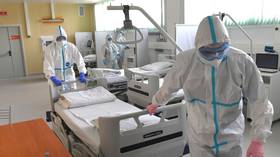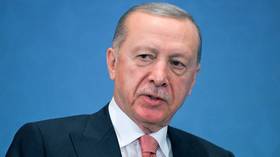Russia again breaks daily Covid-19 death records as over 700 fatalities reported for first time, despite ramping up vaccine drive

Russian health officials have once again announced that the country has hit a grim milestone in the fight against coronavirus, as the country reports record deaths amid an explosive rise in infections driven by the Delta variant.
Authorities announced on Tuesday that a total of 737 people had officially passed away from Covid-19 in the previous 24 hours, for the first time since the pandemic began last year. The previous record had been set on Saturday, when 697 deaths were logged. The country has seen a significant rise in the number of cases since the beginning of June, with the vast majority of fatalities reported in its two largest cities, Moscow and St. Petersburg. However, mortality rates in cities across the country’s regions appear to be lower than at their peak last year.
As officials raced to deal with the growing pressures on Moscow’s health service, Sergey Sobyanin, the capital’s mayor, said that 90% of new infections in the city were down to the new Delta variant, which ravaged India before going on to drive a spike in cases among unvaccinated people in the West. He added that the situation was “rapidly deteriorating,” and that the sudden rise in cases was “quite unexpected” given previously estimated levels of immunity in the population.
Also on rt.com Hammered by infectious new Delta variant, Russia is now finding it has to get deadly serious about Covid-19 vaccine reluctanceMoscow became the first city in the world last month to require workers in public-facing jobs to be vaccinated against the virus. Companies working in sectors like transport, hospitality and leisure have to ensure that 60% of their workforce have been immunized or else face hefty fines. Officials have confirmed that employers who wish to meet the 60% quota can suspend workers without pay if they refuse to get the shot.
However, also on Tuesday, a group of businesses including foreign giants PepsiCo, Nestle, Unilever and Procter & Gamble wrote to Sobyanin to say that they would be unable to meet the targets by the August deadline. The companies said waiting lists for appointments are delaying the process and “the number of vaccines available is significantly reduced”.
Later that day, the mayor announced that the first 100 businesses to meet the 60% goal would be given a rebate of 100% of the personal income tax they had paid for those on their payroll, capped at five million rubles ($68,000 USD). Around 100 grants have also been made available to support firms. At the same time, Sobyanin unveiled a colossal new vaccination hub that will be capable of doling out around 6,000 doses a day, making it one of the largest in Europe.
Last week, rules came into force that require visitors to bars, restaurants and other hospitality venues to scan QR codes before entering. The digital passkeys are available only to those who have received two doses of a domestic vaccine, have recovered from an official diagnosis of Covid-19 in the past six months, or can present a negative PCR test from the past three days. Other customers are currently able to eat outside on terraces and verandas – until next week, when they too will come under the scope of the rules.
Also on rt.com 'Everyone must be vaccinated and re-vaccinated': Russia's re-inoculation drive essential for stopping Covid-19, experts tell RTAnother row over the vaccine program has also come to the fore after Russian NGO The AIDS.CENTER Foundation complained that HIV-positive patients were being turned away from vaccination. Branding this “discrimination”, the organization has written to Health Minister Mikhail Murashko calling for an urgent review. Officials and doctors in countries like the UK and US say there is no basis for denying Covid-19 vaccines to those living with HIV. Russia has one of the fastest-growing rates of HIV infection in the world, with more than 1 million people thought to be living with the virus, which can be controlled with modern medicine.
Responding to the complaint, the head of the Federal Scientific and Methodological Center for the Prevention and Control of AIDS, Vadim Pokrovsky, said that patients diagnosed with the condition should be immunized regardless of their status. “There are no significant contraindications for people living with HIV,” he said.
However, the increased pressure to get vaccinated appears to be working, with queues reported at immunization points across the capital and a number of Russian cities pausing first doses after supplies were used up. According to Minister of Trade and Industry Denis Manturov, around half a million people are being vaccinated each day across the country, a fivefold increase since the first quarter of the year.
Think your friends would be interested? Share this story!














